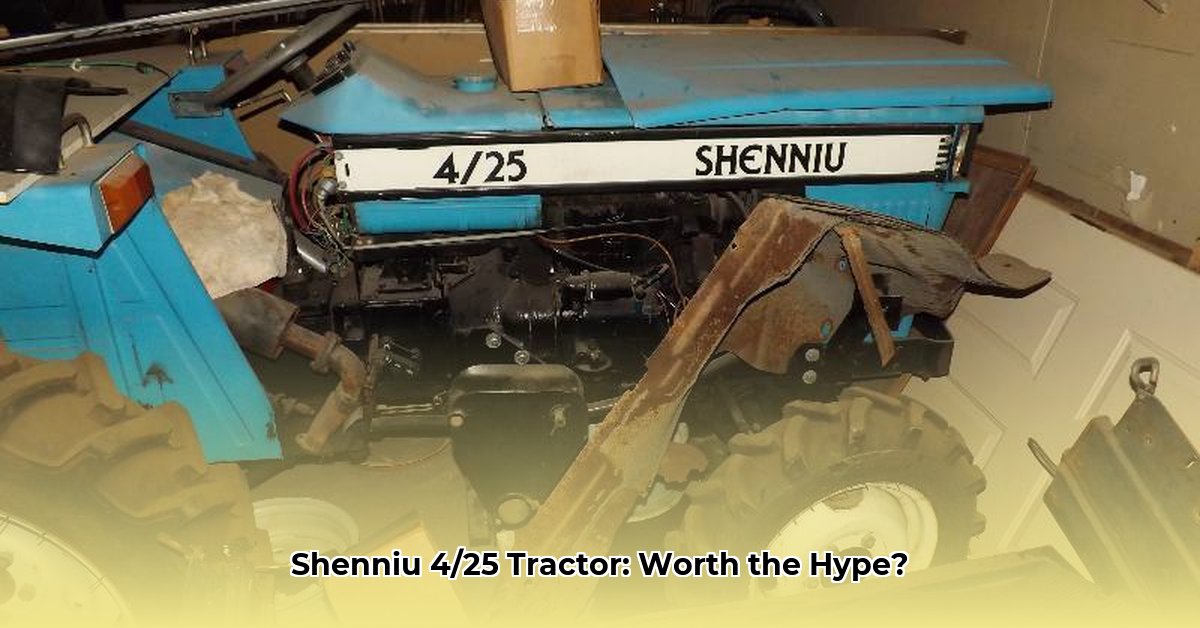
Considering a Shenniu 4/25 tractor for your small-scale farm or homestead? This comprehensive review provides an unbiased assessment, weighing its advantages against potential drawbacks. We'll explore its affordability, versatility, and ease of maintenance, alongside reported reliability concerns. This isn't just a review; it's a practical guide to help you decide if the Shenniu 4/25 is the right tractor for *your* needs and budget. For more on tractor brands, check out this helpful resource on [Case tractor manufacturers](https://who-makes-case-tractors.pages.dev).
Affordability and Accessibility: Budget-Friendly Farming
The Shenniu 4/25's most significant appeal is its lower price point compared to established brands. This makes it especially attractive to budget-conscious farmers and homesteaders seeking sustainable agricultural practices. However, the initial cost savings must be weighed against potential long-term repair expenses. Is a lower upfront cost worth the risk of potentially higher repair bills down the line?
Efficiency and Versatility: A Compact Powerhouse
Despite its compact size, the Shenniu 4/25 offers surprising versatility, handling tasks like plowing, seeding, and material hauling. Its fuel efficiency contributes to lower operational costs compared to larger tractors. However, its capabilities are limited compared to heavier-duty models. Consider the scale of your farming operation and the range of tasks you expect the tractor to perform. Will its capabilities meet your long-term needs?
Ease of Maintenance: User-Friendly Design (Mostly)
The Shenniu 4/25 generally scores well for maintenance accessibility. Many routine checks and procedures can be performed by users with basic mechanical skills. While the simpler maintenance tasks are a big plus, some users have reported surprisingly complex repairs, particularly when dealing with engine, hydraulic, or transmission issues. This highlights the need for preparedness and potentially specialist support.
Preventative Maintenance Schedule: Maximizing Lifespan
This schedule promotes longevity and minimizes repair costs.
| Time Interval | Task | Notes |
|---|---|---|
| Every 25 hrs | Check engine oil, coolant, and hydraulic fluid levels | Low levels indicate leaks or other issues requiring immediate attention. |
| Every 50 hrs | Clean air filter; inspect belts and hoses | Damaged or worn belts and hoses lead to breakdowns; replace as needed. |
| Every 100 hrs | Change engine oil and filter | Use manufacturer-recommended oil and filter for optimal engine performance. |
| Annually | Full service (transmission fluid, lubrication, full inspection) | Professional servicing strongly recommended; crucial for longevity. |
Reliability Concerns: Addressing Reported Issues
While affordability is a key selling point, some users have reported reliability issues. These include difficulty starting (especially in cold weather), hydraulic system problems, and occasional transmission concerns. These problems can result in costly repairs and significant downtime. Addressing these potential issues proactively is essential for minimizing disruptions to your operations.
Troubleshooting Tips for Common Problems:
- Starting Problems: Check battery voltage, clean terminals, and ensure proper fuel supply. A block heater might be necessary in cold climates. Persistent issues warrant professional diagnosis.
- Hydraulic Issues: Inspect fluid levels for leaks; address leaks immediately to prevent further damage.
- Transmission Problems: Pay strict attention to shifting behavior. Avoid overloading the transmission and seek professional repair service if rough shifting continues.
Long-Term Cost Analysis: The Total Picture
The true cost of ownership extends beyond the initial purchase price. Account for fuel consumption, maintenance expenses, potential repairs, and the tractor's overall lifespan. Keeping a detailed maintenance log is crucial for tracking expenses and predicting future maintenance needs. Will the initial savings be outweighed by repair costs and potential downtime in the long run?
Sustainability Considerations: Environmental Impact
The Shenniu 4/25's fuel efficiency contributes to reduced carbon emissions compared to less efficient tractors. However, a comprehensive lifecycle assessment (LCA) is needed to fully evaluate its environmental impact, considering manufacturing processes, material sourcing, and eventual disposal.
Should You Buy a Shenniu 4/25? A Balanced Assessment
The Shenniu 4/25 provides a budget-friendly option for small-scale farmers prioritizing affordability and ease of basic maintenance. However, potential reliability concerns and the need for diligent preventative maintenance must be carefully considered. If uninterrupted operational reliability is paramount, alternative options may be more suitable.
Key Considerations:
- Budget: Is the lower initial cost worth the potential for higher repair expenses?
- Reliability: Are you prepared to invest time and potentially funds in proactive maintenance?
- Scale of Operations: Does the tractor's capacity meet your current and future demands?
This review aims to provide an honest assessment of the Shenniu 4/25 tractor. The information presented is compiled from publicly available sources and user experiences. Always consult the manufacturer's specifications and recommendations for detailed information regarding your specific model.